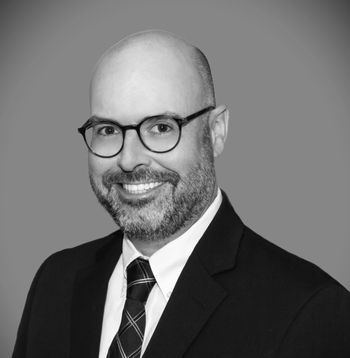PROF ELLWANGER: New 'victim studies' is a fake discipline
Victim Studies fetishizes a particular research object (e.g., victimhood) and applies a hodgepodge of methodologies cribbed from other (genuine) fields like psychology and political science.
Adam Ellwanger is a professor of English at the University of Houston - Downtown. His primary areas of expertise are rhetoric and critical theory. He writes political and cultural commentary for outlets like Human Events, Quillette, American Greatness, The American Conservative, New Discourses, Minding the Campus, and many more.
Are you a college student who is disappointed that victimhood isn’t being sufficiently weaponized in your classes? Are you angry that there simply isn’t enough grievance-mongering on campus? Fall 2023 could be your lucky semester!
Sam Houston State University (SHSU), a public institution about an hour outside of Houston, Texas, recently unveiled its new “Department of Victim Studies.” Students wishing to pursue a degree in this “field” have two options at Sam Houston State: a Master of Science degree in Victim Services Management and a Bachelor of Science degree in Victim Studies. With courses ranging from “Child Abuse and Neglect,” to “Family Violence,” to “Victim Service Delivery,” the degrees aim to prepare students for work as “victim coordinators” in the courts or as “advocates in domestic violence, rape crisis, human trafficking and anti-drunk driving organizations.”
In creating these degrees (which SHSU boasts as being among the first of their kind in the nation), the school has brought an old joke about academia to life. For decades, people have criticized higher education by joking that students are “majoring in grievance studies” or “studying victimhood.” The fact that such programs now actually exist is a sign that the ideological descent of our universities still isn’t complete.
Close inspection of the degree plans shows that the courses really focus on social work – giving forms of institutional assistance to people facing some kind of hardship. That might sound innocuous, but the department’s website hints that left-wing social justice ideology will play a large role in the curriculum. It claims that a purpose of the program is to provide students with the skills to “restore survivors’ feelings of safety.”
[RELATED: PROF ELLWANGER: Unclear how TX universities will react after Gov Abbott bans DEI spending]
A quote from the department chair, Dr. Shelly Clevenger, is featured prominently on the site: “The Victim Studies department is preparing students to better assist victims and make positive change in the criminal justice system.” This is strange, given the programs’ association with SHSU’s Crime Victims Institute. Reforming the criminal justice system suggests that the aim isn’t helping the victims of crimes, but rather about viewing the criminals as victims of a system in need of reform. The idea that criminals are simply victims of unjust systemic forces beyond their own control is a hallmark of social justice ideology.
As noted above, SHSU’s victimhood program seems to direct students towards fields associated with social work. My point is not that social work is bad – there are people in our society who need help, and higher education can teach important skills for addressing that need. Unfortunately, though, social work programs in universities have recently served as vehicles for ideological indoctrination that encourages and incentivizes students to embrace grievance politics and radical theories of social justice. Repackaging “social work” as “victim studies” underscores the politicization of the academy.
Further, there are other reasons that a “Victim Studies” department should give us pause. First, the term “victim” is constantly invoked in academic settings, where it is rarely defined and used in over-broad ways. This expansion of the concept is strategic. The more “victims” that we can identify, the more evidence we have that the existing structures of our society are broken – or worse, evil. The more negatively people perceive society, the more willing they are to accept or endorse radical changes to its institutions. And this, of course, is the point: to foment grievance and train foot soldiers who can advance the left’s cultural revolution by posing as selfless do-gooders.
[RELATED: PROF. ELLWANGER: The End of Affirmative Action on Campus? Don’t Bet on It.]
Further, contrary to the assertions of SHSU’s website, there is no “field” of Victim Studies. Strictly understood, an academic field is an area of intellectual inquiry that lays claim to a particular object of study that experts explore through the application of unique research methodologies. By that definition, “Victim Studies” isn’t a real field. Victimhood is already commonly addressed in fields like psychology, sociology, and ethics – fields that have methods of inquiry that are unique to their disciplines.
In contrast, the “field” of Victim Studies involves the fetishization of a particular research object (e.g., victimhood) and applies a hodgepodge of methodologies cribbed from other (genuine) fields like law, psychology, and political science. Essentially, “victim studies” has no new knowledge to contribute that couldn’t be developed from within other disciplines that already exist. A “department of victim studies” is redundant.
At bottom, this new program is just another money-grab – an effort to attract students by adding novel degrees that can’t be acquired at any regional competitors. On top of that, the fact that the courses can conveniently be completed online ensures that the school can take advantage of applicants outside of southeastern Texas. Inevitably, similar programs at other nearby universities will emerge, if only to compete for those students’ tuition dollars.
Finally, the debut of this program teaches us one more lesson. Even in a state like Texas, which has recently passed legislation that aims to halt the spread of left-wing DEI activism through institutional policy, the state’s coordinating board is still willing to sign off on new degrees in pseudo-disciplines that will clearly function to transmit social justice ideology. In our quest to restore the political neutrality of our colleges and universities, there is much work left to be done.
Editorials and op-eds reflect the opinion of the authors and not necessarily that of Campus Reform or the Leadership Institute.

